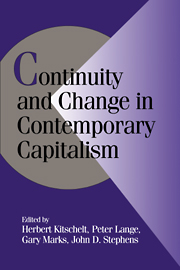Book contents
- Frontmatter
- Contents
- List of Contributors
- Preface
- Introduction
- PART I THE INTERNATIONAL SETTING FOR POLITICAL-ECONOMIC STRATEGIES
- PART II THE DYNAMICS OF DOMESTIC POLITICAL ECONOMIES
- PART III POLITICAL ECONOMY AND DEMOCRATIC COMPETITION
- 10 Politics without Class: Postindustrial Cleavages in Europe and America
- 11 European Social Democracy between Political Economy and Electoral Competition
- 12 Contemporary Christian Democracy and the Demise of the Politics of Mediation
- 13 The Political Economy of Neoliberalism: Britain and the United States in the 1980s
- 14 Movements of the Left, Movements of the Right: Putting the Mobilization of Two New Types of Social Movements into Political Context
- PART IV CONCLUSION
- References
- Index
- Title in the series
13 - The Political Economy of Neoliberalism: Britain and the United States in the 1980s
Published online by Cambridge University Press: 05 June 2012
- Frontmatter
- Contents
- List of Contributors
- Preface
- Introduction
- PART I THE INTERNATIONAL SETTING FOR POLITICAL-ECONOMIC STRATEGIES
- PART II THE DYNAMICS OF DOMESTIC POLITICAL ECONOMIES
- PART III POLITICAL ECONOMY AND DEMOCRATIC COMPETITION
- 10 Politics without Class: Postindustrial Cleavages in Europe and America
- 11 European Social Democracy between Political Economy and Electoral Competition
- 12 Contemporary Christian Democracy and the Demise of the Politics of Mediation
- 13 The Political Economy of Neoliberalism: Britain and the United States in the 1980s
- 14 Movements of the Left, Movements of the Right: Putting the Mobilization of Two New Types of Social Movements into Political Context
- PART IV CONCLUSION
- References
- Index
- Title in the series
Summary
If ever a scholarly claim for Anglo-American exceptionalism received empirical support, it was during the ascendant New Right administrations of Margaret Thatcher and Ronald Reagan. During the 1980s, these governments embarked on a systematic and comprehensive project of fiscal retrenchment, financial and labor market deregulation, and erosion of the Keynesian assumptions that had underpinned postwar economic and social policy. The ideological bases of the New Right agenda have been examined in detail, as have the policies attempted in their name (Cooper, Kornberg, and Mishler 1987; King 1987; Hoover and Plant 1988; Jordan and Ashford 1993; Marsh and Rhodes 1992; Palmer and Sawhill 1984; Palmer 1986; Campbell and Rockman 1991; Heclo and Salamon 1982). But theories of political economy have yet to be satisfactorily applied to these two cases. This chapter employs recent work in the study of the relationship between organized interests and the state to cast light on features of the policies pursued in the 1980s.
The United States and Britain were not the only two countries that swung electorally to governments espousing neoliberal principles. A bourgeois coalition government came to power in 1976 in Sweden, ending over six decades of social democratic hegemony, while in the early 1980s coalition governments with a similar ideological complexion came to power in Germany, the Netherlands, and Denmark. But the impulse toward retrenchment and deregulation under these administrations was never strong, perhaps surprisingly so given the neoliberal rhetoric that preceded their arrival in power (for the German case, see Esser 1986).
- Type
- Chapter
- Information
- Continuity and Change in Contemporary Capitalism , pp. 371 - 397Publisher: Cambridge University PressPrint publication year: 1999
- 61
- Cited by

